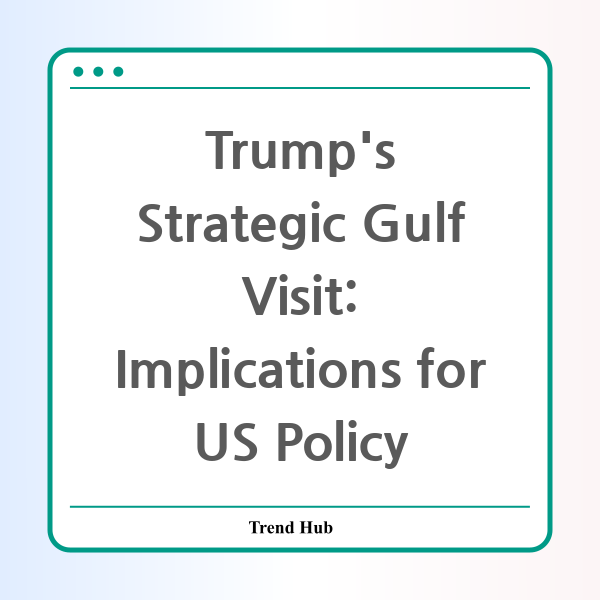* This website participates in the Amazon Affiliate Program and earns from qualifying purchases.

As President Trump embarks on a pivotal visit to three of the wealthiest nations in the Gulf—Saudi Arabia, Qatar, and the United Arab Emirates—his transactional approach to foreign policy is poised to reshape diplomatic ties in the Middle East. What do these energy-rich nations desire from the U.S. during this visit, and how might their objectives align with Trump’s agenda?
This visit, marking Trump’s first state visit of his second term, is strategically significant. It highlights the strengthened relationship between the U.S. and these Gulf states, which is a considerable shift from the Biden administration's perceived indifference toward their concerns. Trump's arrival is anticipated not just for formalities but to engage in substantive negotiations that could yield immense benefits for both sides.
Despite criticisms regarding his unpredictable foreign policy, Trump has undeniably fostered deeper ties with the Gulf nations. Each country has its unique set of goals, and understanding these can provide insight into the broader implications of Trump’s Middle Eastern diplomacy.
- Saudi Arabia: The Kingdom's foremost desire is to secure a robust U.S. security pact that guarantees its defense commitments. Additionally, it is advocating for cooperation in developing a civil nuclear program, a move complicated by domestic Uranium enrichment demands.
- United Arab Emirates: The UAE is focused on establishing a leadership role in artificial intelligence by 2031 and pledging substantial investments in the U.S. economy. However, efforts may be hampered by U.S. restrictions on advanced technology exports.
- Qatar: Hosting the largest U.S. military base in the region, Qatar seeks to strengthen its security agreements and potentially negotiate for the lifting of sanctions on Syria, a request that could create tensions.
As Trump navigates through these priorities, his administration aims to secure more than just agreements; it is also about reshaping the Middle East’s diplomatic landscape. Analysts have noted that Trump’s less ideological and more pragmatic approach contrasts sharply with the previous administration's stance, which often focused on moralistic considerations.
This shift has led to a new reality—one where traditional alliances are being revisited and redefined. Trump’s discussions in Riyadh may very well sideline traditional allies, such as Israel, particularly with the current Israeli government’s actions in Gaza drawing international condemnation.
Critics within Israel express concern over the potential erosion of its longstanding relationship with the U.S. and fear of losing influence as the Gulf monarchies gain favor. This juxtaposition poses intriguing questions about the future of U.S. support for Israel amidst a changing Middle Eastern order.
In related discussions, prominent commentators have explored the nuances of Trump's Middle East policies, specifically regarding Iran. The implications of Trump’s Gulf tour may signify a pivot away from Israel’s hardline policies, as evidenced by his willingness to reconsider sanctions against Syria at the behest of his Gulf hosts.
Overall, Trump's visit is expected to culminate in lucrative deals that not only enrich the Gulf states but also reaffirm their status as indispensable partners in U.S. foreign policy. Both sides are likely to reap significant economic rewards, with the White House estimating commitments exceeding $2 trillion across various sectors, including arms sales and technological collaborations.
In conclusion, as the Gulf states navigate their ambitions during Trump's diplomatic endeavor, the consequences for U.S. foreign policy and regional stability remain profound. The evolving dynamics showcase a competitive landscape where investments, security, and technological advancements dictate allegiances and influence, setting the stage for a new era in Middle Eastern diplomacy.
* This website participates in the Amazon Affiliate Program and earns from qualifying purchases.